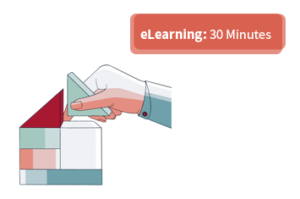Continuing Professional Development, or CPD, has become an important part of our professional lives, however, many of us don’t know the requirements or how important it is for our businesses and our own career progression.
We’ve collated the following information, to help you better understand the need for completing CPD and we’ve provided some top tips for how to get the most out of your ongoing learning.
What is CPD?
CPD stands for Continuing Professional Development, which is a term used to describe the proactive ongoing education undertaken by professionals.
It includes various learning methods such as workshops, conferences and eLearning courses. This can be accompanied by on-the-job training or professional learning, allowing individuals to broaden their knowledge and expertise of their industry.
Who does CPD apply to?
Individuals who are regulated by the Financial Conduct Authority (FCA) are required to undertake lifelong learning throughout their career, and record it towards their overall development goals.
The Insurance Distribution Directive (IDD) came into effect in October 2018. As the name suggests, the IDD applies to all businesses and individuals involved in the insurance distribution chain, from insurance providers and underwriting firms to Mortgage Brokers and Independent Financial Advisors (IFAs) that sell protection.
The Financial Conduct Authority (FCA) has confirmed, in chapter SYSC 28.2, that Continuing Professional Development is a requirement for all firms and relevant employees, in order to ensure they possess “appropriate knowledge and ability in order to complete their tasks and perform their duties adequately.”
An insurance professional must comply with “continued professional training and development requirements in order to maintain an adequate level of performance corresponding to the role they perform and the relevant market…. Training and development can encompass various types of facilitated learning opportunities including courses, e-learning and mentoring.”
Those who are involved in selling protection and General Insurance (GI) products will have to comply with the Insurance Distribution Directive (IDD). The minimum requirement is “15 hours of professional training or development in each 12 month period.”
By completing the annual CPD requirement, you will demonstrate your commitment to meeting the expectation under the legislation of maintaining your skill to provide professional advice.
(All references in this section refer to section 28.1 of the FCA Handbook and onwards https://www.handbook.fca.org.uk/handbook/SYSC/28/1.html)
Why is CPD important?
Continuing Professional Development is not just a regulatory requirement but it can also help individuals and their businesses to keep up-to-date with the latest industry trends and stay ahead of their competition.
“Knowledge isn’t power, applied knowledge is power.” – Eric Thomas, motivational speaker and author.
Attaining the required CPD total should not just be seen as a tick box exercise. It is a way for individuals to build their professional confidence and apply their knowledge to improve the quality of their work, which can ultimately lead to career progression and expansion into other fields. It is also a useful approach to demonstrating your commitment to your clients.
80% of people agreed learning new skills would make them more engaged. Engaged employees typically have a greater commitment to quality and safety which can result in improvements to the whole business, such as a 20% increase in sales.
(Reference: https://edume.com/blog/continuous-learning-in-the-workplace)
Top Tip: Create a schedule to ensure you set aside time to complete research on the right CPD activity for you and actually complete it.
A further benefit of maintaining your CPD requirements is the potential networking prospects. Share your new-found knowledge and insights with colleagues in your company or peers within the General Insurance and Mortgage industries. Many CPD accredited events will provide you with the opportunity to connect with other people in your industry, so you’ll have the chance to widen your network.
Staying up to date with CPD
As rules and regulations can change frequently, it’s important to remain agile and brush up on the latest guidelines to make sure that you’re fully compliant in your role.
For example, the landlord’s mortgage tax relief changes in April 2020. This could be seen as a confusing amendment to many people, due to the multiple bandings and percentages. However, by completing training and your own research to ensure you understand the new rulings, you can provide accurate information to help your clients understand the possible costs and implications of owning a buy-to-let property.
Top Tip: Recording your ongoing learning is not only a regulatory requirement, but it allows you to look back and reflect on your progress.
CPD totals renew annually and points cannot be carried over (unless under exceptional circumstances). Therefore, individuals will need to maintain their education each year and provide evidence of the learning they have completed, via a certificate or other proof of completion.
“The only true wisdom is in knowing you know nothing.” ― Socrates, philosopher
What counts towards CPD?
All CPD recognised activity must relate to and address the individual’s development needs. Minimum requirements of which study topics to cover are available within the FCA Handbook (section SYSC 28.2.3). Topics include adequate knowledge of the products or policies offered and the insurance market, claims and complaints handling and assessing customer needs. Visit the FCA website to find all of the minimum necessary requirements.
Your CPD study can be made up of the following styles:
Structured CPD studying (or active learning), which must involve interaction or participation. For example, this would include;
- Training courses
- Workshops
- Seminars or lectures
- eLearning modules
- Professional exams and qualifications
Reflective CPD (or passive learning), which does not require involvement, includes;
- Reading and researching industry news
- Listening to podcasts
- Internal training
You can also supplement your active and passive learning with self-directed CPD (or unstructured learning). This would include reading documents and trade publications which help towards a specific development need and can count towards your overall CPD total goal.
Due to COVID and everything moving to digital, you no longer have to worry about attending courses that are local to you, or having to travel to find suitable learning. You can now attend virtual training courses and complete online activities to attain and accumulate points.
How is CPD assessed?
Individuals must keep track of their completed CPD activities, for example, via a CPD record form, ensuring that it is an accurate reflection of the activities they have undertaken and that each entry meets the requirements of the professional body or association. You should retain your records for at least 3 years and be prepared to provide evidence to the Financial Conduct Authority (FCA), upon request.
Each CPD activity is awarded a set amount of CPD points, units or credits in relation to the time taken, the type of activity that was involved and how it relates to the individual’s professional development. These points total up towards the industry’s minimum number of hours to complete annually, which is 15 hours under the IDD.
Top Tip: Record your CPD activity and upload any associated proof of completion straight away so you don’t forget the details, such as time spent, date and key learning achieved.
We’ve created a Google sheet template for you to record all of your completed CPD activities. You can amend the columns to suit your individual style. You’ll also be able to retrieve an analysis of your records, to see which topics you’ve covered and how close you are to achieving your overall goal.
CPD with Source LearningLab
The Source LearningLab is home to a range of helpful videos, eLearning modules and downloadable eBooks on relevant industry topics, to boost your General Insurance knowledge. You can access all content 24/7, to suit your learning preferences and support your mandatory CPD requirements.
Providing a completely refreshed library of resources for 2021, with all new modules and styles of learning. Source releases new modules every month for you to complete, with topics such as how to remain GDPR compliant and how to deal with complaints. You’ll also find smaller modules on soft skill topics, such as time management and tips for engaging with your customers.
All of the Source LearningLab content is completely free and is exclusively available to brokers and intermediaries registered with Source.
Top Tip: Revisit the LearningLab every month to check out our latest module.
When you’ve finished a CPD module from Source, you’ll receive a downloadable certificate as proof of your participation.
Top Tip: Make your clients aware of your completed CPD, via your website or social media channels, providing them with peace of mind that the information you give them is current and correct.
You can also earn CPD points by attending our virtual DIGI-conferences and in-person Masterclass events, during which we discuss important industry topics and how to apply regulatory requirements to your everyday role.
How much does it cost?
You should be able to easily find free CPD content, such as via the Source LearningLab. However, if you are required to pay for training that count towards your CPD goal, you may be able to claim tax relief.
According to the gov.uk website “You can claim allowable business expenses for training that helps you improve the skills and knowledge you use in your business (for example, refresher courses).” There are restrictions to this, so make sure you check before paying out or attempting to claim.
For an example of the type of content you’ll have access to with the Source visit our LearningLab hub



